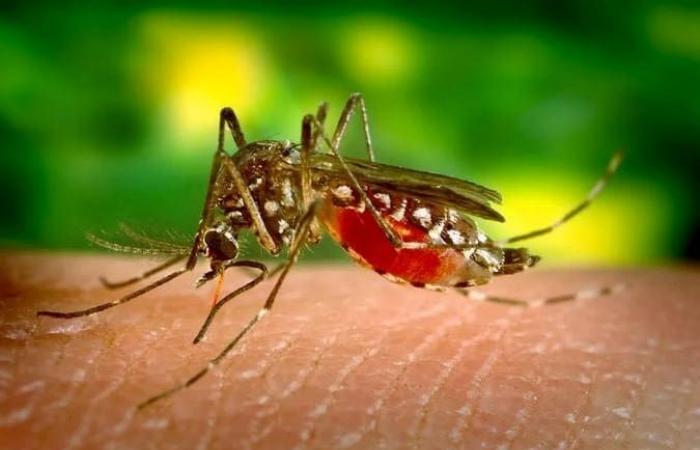Dengue is transmitted through the bite of the female Aedes aegypti | Photo: Pixabay/Disclosure
A British company with a branch in Brazil is selling a new measure to combat dengue fever at home. For R$299, you can buy a box of mosquito eggs Aedes aegypti genetically modified. Just put it in water and, within a maximum of 14 days, only males are born – the females, responsible for transmitting the virus, do not survive. The solution, however, is viewed with skepticism by experts.
The technique works by introducing a self-limiting gene (tTAV) that interrupts the proper cycle of cells in the body. Aedes by producing in excess a protein responsible for producing other essential proteins necessary for the animal’s development, which hinders the females’ ability to survive until adulthood.
The idea, manufactured by the company Oxitec, is to reduce the reproduction rate of the species itself, reducing the number of females. The recommendation is that there be continuous use: one box must be opened every 28 days.
In the opinion of experts, the effectiveness of the solution in homes is questionable. “I think it doesn’t make a big difference whether a house or a small group of people uses it, because mosquitoes are in the neighborhood, on the block, in the neighborhood. Although 80% of people become infected indoors, it doesn’t mean that the mosquitoes only live there. The impression I have is that it can’t be done without public authorities”, says public health doctor Cláudio Maierovitch and former director of Communicable Disease Surveillance at the Ministry of Health.
The company was contacted by the Folha de S.Paulo report and did not want to give an interview or answer questions, claiming that it had already had a problem with the vehicle before. In 2023, the newspaper reported the legal dispute involving authorization for the use of the product with environmental agencies and Anvisa (National Health Surveillance Agency).
Until then, the biotechnology company was limited to selling mosquitoes to municipalities, with the approval of the body responsible for authorizing genetically modified organisms in the country, the National Technical Commission for Biosafety. Anvisa went to court and lost the case in the 1st instance, and filed an appeal and is now awaiting a new trial in the 2nd instance.
At the time, in the report, Luciana Medeiros, coordinator of field operations for health programs at Oxitec, said that studies showed the need for at least five modified mosquitoes for each wild one in order to maintain insect suppression. The proportion would be reached considering the quantity of insects expelled in the boxes sold by the company.
According to José Maria Gusman, professor of agronomy at Unesp (Universidade Estadual Paulista) and technical member of CTNBio who participated in the evaluation of the first version of the device, a very large number of mosquitoes would be needed for the experiment to be effective.
“The efficiency is debatable. The modified mosquitoes compete with males and the result can only be seen in the next generation, if it works. Furthermore, if you release the mosquito, this does not guarantee that it will stay in your house.”
Piracicaba (SP) invested R$3.7 million in the technology after signing an agreement in 2016 for Oxitec to release mosquitoes for two years and monitor the area for another two years. However, the company released less than half the number of insects considered appropriate, thus not guaranteeing protection, which should have been achieved in May 2018.
Other experiments by the company in the Bahian cities of Juazeiro and Jacobina, between 2013 and 2015, had controversial results. At the time, Oxitec was carrying out the test in partnership with the company MoscaMed, with funding from the Bahia Department of Health.
According to Gusman, who followed one of the tests, the mosquitoes did not bite, but there were so many that they caused discomfort among the population. “There were a lot of complaints. They kept buzzing in people’s ears, and, surely, this will happen in homes,” he says. Due to its similar appearance Aedes traditional, he says there is still a risk of confusion between both types.
“This story goes back many years, we discussed it in Saúde, we followed the project in Bahia and, during that period, we were all worried because there was a dispute between MoscaMed and Oxitec. The company was looking for the market, which it was unable to reach at the Ministry, it was look for it in the municipalities and now try it in the retail market”, says Maierovitch.
There are also concerns regarding the insect’s contact with a substance called tetracycline. The modified mosquito is developed and raised in an environment rich in the compound. When coming into contact with the substance, the female would not die in the larval stage, which could have an opposite effect on the environment: instead of reducing the number of mosquitoes, it would increase.
In 2020, the American agency that regulates environmental products (EPA) authorized Oxitec to carry out pilot tests of the technology with mosquitoes in regions of Florida and California. However, in 2022, it banned the release of mosquitoes in areas located less than 500 meters from possible sources of the tetracycline antibiotic, such as sewage treatment plants, fruit-producing areas and livestock and farm facilities. This type of restriction does not exist in Brazil.
According to Gusman, at the time of release by CTNBio, there were still many conditions to be verified.
To Folha de S.Paulo, CTNBio stated that the technical analysis considered the genetically modified mosquitoes from the company Oxitec to be as safe as those Aedes Aegypti unmodified, and therefore the decision was to approve it for commercial use.
For Helena Dutra Lutgens, president of the Association of Scientific Researchers of the state of São Paulo, the device can also create a false sense of security and cause buyers to reduce actions that are proven effective against mosquito proliferation, such as cleaning gutters. and potted plants. “There are no walls and fences for mosquitoes. It’s not real security,” she says. (Luana Lisboa/ Folhapress)
—
THE TIME reinforces the commitment to quality, professional and Minas Gerais journalism. Our newsroom produces responsible information every day that you can trust.
Follow THE TIME on Facebook, on Twitter and on Instagram. Help grow our community.
Tags: Experts dispute effectiveness modified mosquitoes combating dengue
--





